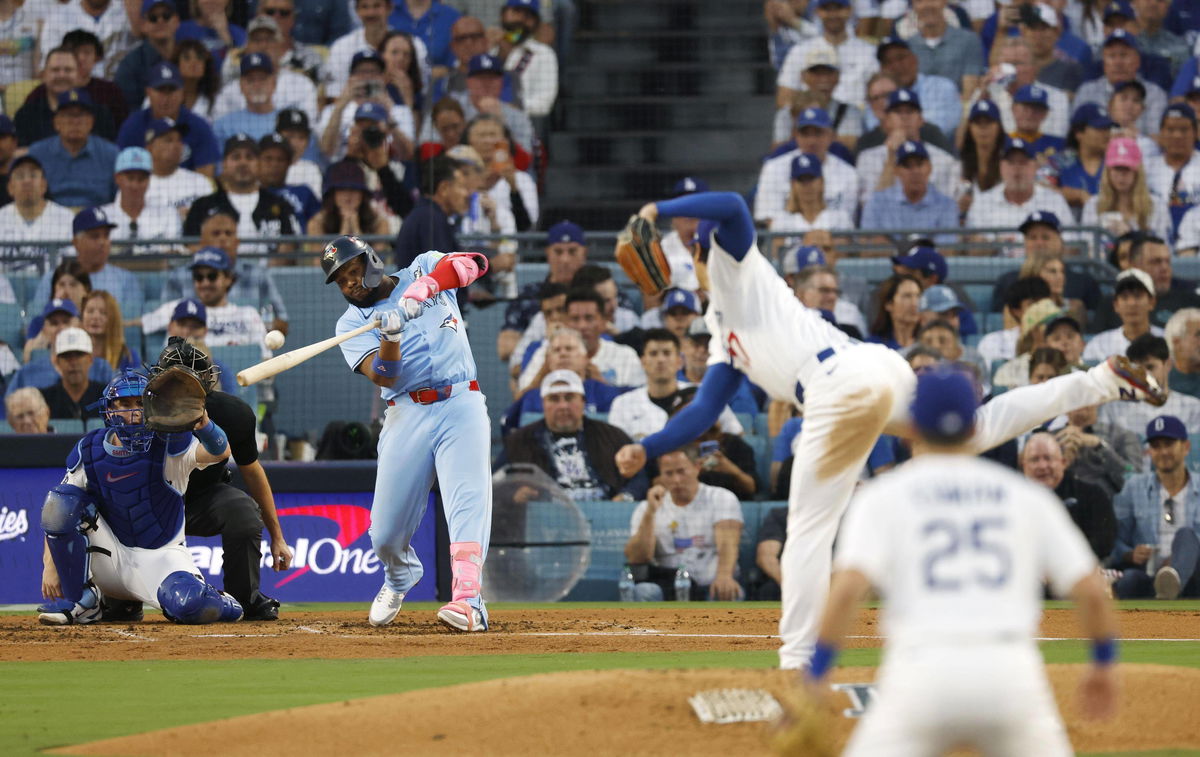
Imago
Baseball: World Series Toronto Blue Jays slugger Vladimir Guerrero Jr. hits a two-run home run off Los Angeles Dodgers starter Shohei Ohtani in the third inning of Game 4 of the MLB, Baseball Herren, USA World Series at Dodger Stadium in Los Angeles on Oct. 28, 2025. PUBLICATIONxINxAUTxBELxBIHxBULxCZExDENxESTxFINxFRAxGEOxGERxGRExHUNxISLxIRLxITAxLATxLTUxLUXxLIExMKDxNORxPORxPOLxROUxSVKxSUIxSRBxSLOxESPxTURxUKxUAExONLY A14AA0004984799P

Imago
Baseball: World Series Toronto Blue Jays slugger Vladimir Guerrero Jr. hits a two-run home run off Los Angeles Dodgers starter Shohei Ohtani in the third inning of Game 4 of the MLB, Baseball Herren, USA World Series at Dodger Stadium in Los Angeles on Oct. 28, 2025. PUBLICATIONxINxAUTxBELxBIHxBULxCZExDENxESTxFINxFRAxGEOxGERxGRExHUNxISLxIRLxITAxLATxLTUxLUXxLIExMKDxNORxPORxPOLxROUxSVKxSUIxSRBxSLOxESPxTURxUKxUAExONLY A14AA0004984799P
The Dodgers, chasing back-to-back championships, sent their two-way superstar Shohei Ohtani to both hit and pitch in the season’s showdown against the Toronto Blue Jays. But before the bottom of the first inning even started, controversy erupted. Ohtani received extra warm-up time on the mound, and suddenly everyone, from broadcasters to the Blue Jays’ dugout to fans on social media, was revisiting the rulebook. That pause sparked a discussion on rules, and fans aren’t pleased.
Watch What’s Trending Now!
The discussion began right after the first inning.
Shohei Ohtani had just finished his at-bat and was switching to the mound. FOX announcer John Smoltz noticed Ohtani was getting about three minutes to warm up, nearly double the usual 90 seconds for starters. This caught the attention of the Blue Jays dugout, too. What followed was manager John Schneider approaching home plate umpire Jordan Baker for an explanation.
The moment FOX Sports: MLB posted the video on social media with the caption, “John Schneider spoke with Jordan Baker in-between innings after Shohei Ohtani got extra warm-up time before the bottom of the 1st,” the internet exploded.
Fans were not only questioning the decision but also the integrity of the postseason, with accusations of favoritism and rigging spreading rapidly across platforms.
John Schneider spoke with Jordan Baker in-between innings after Shohei Ohtani got extra warm-up time before the bottom of the 1st
📺: #WorldSeries Game 7 on FOX pic.twitter.com/w2bWNQZz76
— FOX Sports: MLB (@MLBONFOX) November 2, 2025
The official rulebook says that the timer for between-innings starts when the last out is made, unless the pitcher is on base, on deck, or at bat when the inning concludes. The timer doesn’t start until the pitcher leaves the dugout and goes to the mound in that situation. Also, a rule change in 2023 lets umpires provide extra time “if warranted by special circumstances.”
The example MLB gives is of a catcher who needs time to put on gear after being thrown out on the bases, but the idea applies to any player who needs time to switch positions in odd situations.
Probably, in that “special circumstances” context, the announcers joked, referring to Tony Stark. “Doesn’t that kind of defeat the whole purpose of having your own plane if it departs before you arrive?” That’s what Iron Man said.
It was a light-hearted comment about protecting baseball’s biggest star. Evidently, Shotime is a vast deal for MLB, as he has not only increased tourism, especially from Japan, but also accounted for 57% of all MLB sales at MLB Store Japan and Fanatics Japan. And that’s just a tiny part of the business.
But knowing the rule or the business didn’t make anyone feel better. And Shohei Ohtani’s performance on the mound didn’t really make the extra time worth it.
He pitched for only 2.1 innings, giving up five hits and three earned runs while only striking out three batters. Bo Bichette of the Blue Jays hit a home run off of him. This time, Shotime didn’t seem dominant even after the extra time.
Fans spark debate over fairness around Shohei Ohtani
The rules might have been on Shohei Ohtani’s side, but the court of public opinion wasn’t having it. Social media became a battleground of frustration, conspiracy theories, and biting sarcasm.
MLB directly came under scrutiny. One comment read, “@MLB trying to fix it for the @Dodgers. Clearly, it should be the same rules for all teams and players.” While the rules technically applied equally, the perception that only the Dodgers benefited from obscure rulebook clauses reinforced suspicions about favoritism. Their recent championships and star-studded roster make them a target for claims that the league favors profitable franchises over other clubhouses.
“Holy sh-t, the ump is on his payroll.” Fans have long believed that star players receive favorable calls, and this situation became the fuel. With Ohtani being a top player and the Dodgers in a major media market, many see questionable decisions as evidence of bias toward big-name teams.
It led to making a stronger case for the robot umpires. One fan mentioned, “This will be the last MLB playoff game without robot umps. 😳” The automated strike zone debate has gained serious momentum as fans grow tired of human error and perceived bias. This fan views the Ohtani warm-up situation as another data point in favor of removing human judgment from officiating.
Then comes the sarcasm! “Ohtani literally has his own rules, apparently!” This reflects frustration that superstar treatment extends beyond subjective calls to actual rule applications. Ohtani’s unprecedented contract and cultural significance make him untouchable in many fans’ eyes, and this moment seemed to confirm those suspicions. The fact that MLB’s rulebook technically allowed the extra time didn’t matter. The perception that rules get bent for certain players overshadowed any technical justification.
Not everyone bought into the controversy, though. “lol this bum will complain about anything.” Some fans thought Schneider’s complaint sounded like whining instead of a real issue. They tried to mention that managers might exaggerate problems to gain an advantage.
Whether the rules justified it or not, the warm-up controversy exposed baseball’s ongoing struggle with transparency and consistency.






